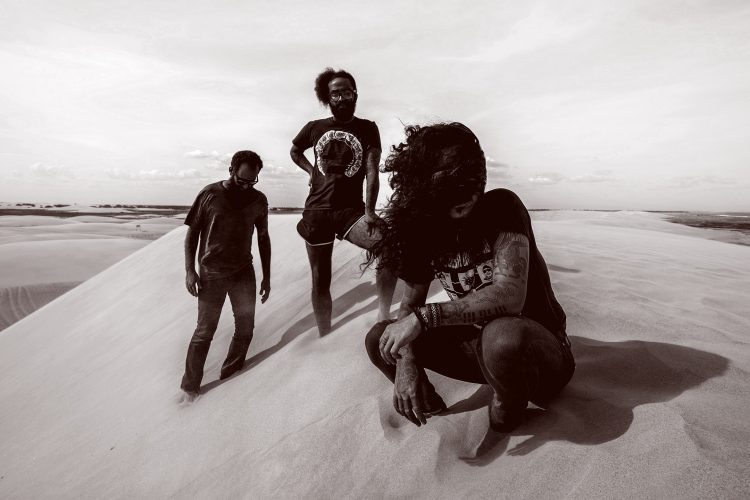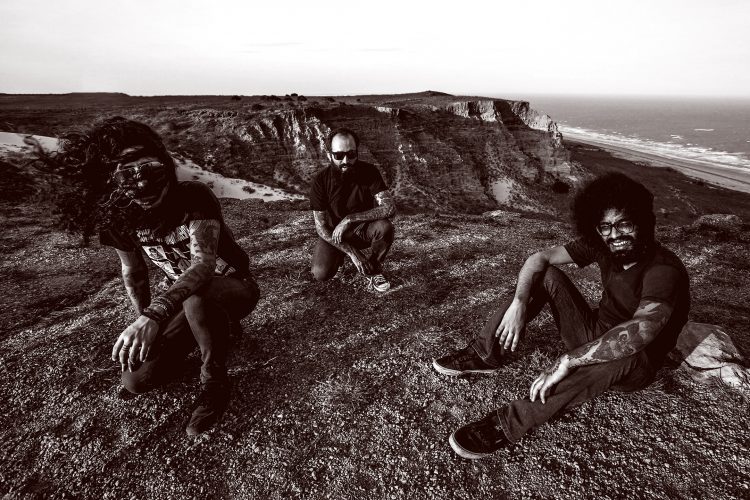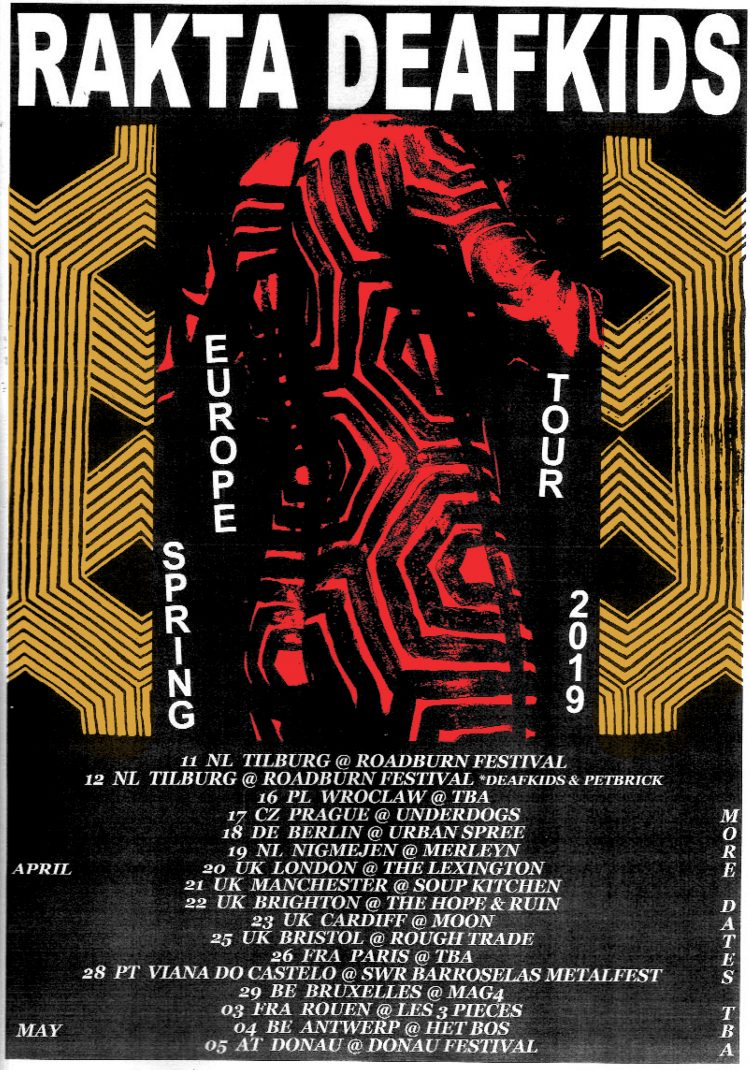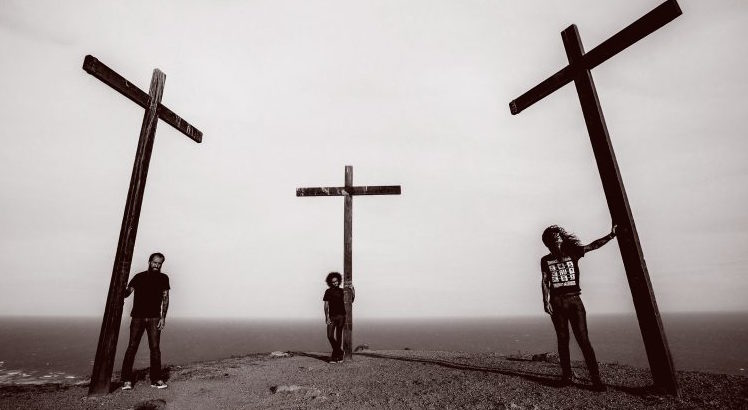Talk to us about the creative process behind creating Metaprogramação?
Mariano: We returned from a European tour in the middle of 2018 with the aim of writing and composing this record as fast as we could, to reach the due-dates we’ve had for its release and this year. That meant we had a month and a half for the whole process!
At that time, we already had “Espiral da Loucura” (released as a single earlier, that year) and “Templo do Caos” (which we were already playing on the same tour), so all the rest was built from scratch!
I think the process we started in Configuração has already rooted in us to a point where we have some sort of a blueprint to work on, something to use as a common ground and go from there.
We wanted to explore this past/future dichotomy in a more explicit way, and these were elements we were exploring for a while – with better comprehension and bigger knowledge. We had the opportunity to immerse ourselves in the record, thanks to the help of our friends João and Barata from TEST – we borrowed their home studio for a while – we wrote, rehearsed and took rough mixes of what the songs would become. This is something we never did before, and it helped a lot. I think the cogs are oiled enough to take this pressure as a positive thing, to feel encouraged to create with more intensity.

How important is Afro-Brazilian culture to what Deafkids create?
Mariano: Brazilian music is based on the conflicting and harmonious relationship of African/Indigenous/European music, and their own conflicting relationships. That reflects in the broad spectrum of music manifestations in Brazil -–there is Frevo, with street bands possessing extremely complex horn sections reminiscent of European military bands, as well as the Armorial movement and its connection to the Arabic structures and modes that deeply influenced Spanish and Portuguese music, the drum ensembles of Bahia, Samba and the whole path that it involves (mixing something as literate and harmonically complex as Chorinho and the more drum-centered Samba de Coco from Bahia with many other influences) and so forth.
The way Brazilian culture deals with this is quite different from the North-American culture, for example. These elements seem to be mixed in a more intertwined way, and they merge into another on a way that’s harder to separate. ‘Afro-brazilian’ is a complex thing to address, as it could mean many things.
We feel very connected to all of that, for it reflects what we are as well. It comes to a time where the spirit of music has a way to show that a certain orthodoxy we aim for when we identify to something ends up being something highly restrictive, for we are many things at the same time – as people we all come from somewhere, we have been to places, experienced things, have a personal relationship to past, present and future…
We are not Europeans, so even what’s European in our culture won’t be created or experienced in the same way – we will have other energetic connections to what we do, other social conflicts and contradictions to deal with, another culture surrounding us – it doesn’t determine who you are, but it affects you in indelible ways.
As all of this music is both inside of us and around us, and as it is music that carries this social imprint, of people going somewhere to be with music in a more curative way, to step inside not by outside aesthetic identification only, but as connection to the sound that’s being produced itself, it has an approach that we feel very connected to.
Because of its Portuguese influence, music in Brazil has this tradition of being lyric-centered, with song structure in Brazil generally being the basis for the poetry that comes with it. Much of the ‘avant-garde’ music takes this narrative perspective in consideration as well, with the song (in structure or melody) both denying or reaffirming the lyrics.
I think the side of Brazilian music that feel more connected to is the African part of Brazilian culture – music which is more based on trance, on the sound as a phenomenon itself… music that pulsates in a less restricted, more corporal way (and in that sense connects itself to Afro-Latin, Indian and some Eastern musical backgrounds).
Lyrics are less something that is meant to be interpreted, but its message becomes something conveyed by the song itself, by the sound and the way it reaches you. Words are something that add to something that already has a meaning of another nature, in the same way of a mantra is not just words meant to be taken literally, but as a absorbing chant that resonates inside you.
It is music that trusts more on the expanded and controlled freedom of rhythm to reach other levels of consciousness. Percussionists and composers like Djalma Correa, Naná Vasconcelos and Pedro Santos, the psychedelia of Pernambuco in the 70’s, 60’s and 70’s Umbanda records… these are some of the Brazilian musical influences which we consider to carry these characteristics, in one way or another.
Label: Neurot Recordings…Pre-order DEAFKIDS: METAPROGRAMAÇÃO
HERE!

When did you realize that you wanted to take your sound beyond D-BEAT?
Mariano: Perhaps the way we see it is that we wanted to explore D-beat as a groove, you know? To strip it out of genre or instrumentational conventions and to explore the rhythmic possibilities of it, as it is a really strong, syncopated beat that has the power to induce this trance, just as much of the percussive music we enjoy so much. We wanted to broaden the spectrum of what could be achieved by treating d-beat not just in terms of a punk composition, but as a foundation for mind-altering trips. That made us create other beats which are based on it, create open beats to lay on top of it, and generate more percussive rhythms played with that type of intensity. I think we shifted perspectives on what it meant and the changed the structures generally attached to it, but it’s there even when it isn’t.
How would you describe the emotional experience of your performance?
Mariano: For me (and all of us, I guess), playing live is something beyond. As a drummer, things get so physical it all happens in a really unique slow-motion kind of thing.
You have complete awareness of what’s happening, but at the same time you’re reacting energetically to everything… it is where, through sound and mind, certain divisions among people fade away, and you’re able to communicate in a more in-depth way, one that isn’t attached to the boundaries of written/spoken language.
When you get people to react to it, and dance together, they become more aware that they’re actually as much responsible for what’s happening as we are, because of this huge amount of energy flowing towards and out of us. That’s a transcendental experience in itself, and it reinforces the character of music (specially live) as something with a healing power, something with a cleansing ability, with social function, reuniting body and emotion for all the people involved.
Douglas: For me it’s always a discharge of energy through sound. Most of the time, it literally washes my soul. I feel like an experience of communing with the universe and people on a powerful and subtle level at the same time, it’s a literal exchange of energy through sound. it is like experiencing those moments of non-individuality in life, where time and space unfold somehow, and you totally forget about ‘I’, you’re just a channel for the sound to come. I’ve had a few cases where at that moment of the loudest echo feedback and the longest scream my mind was teleported to another place, all the sound and vision disappeared completely for a moment and then everything slowly came back in slow motion until I get to understand where the music was haha.
I don’t know how to explain, but for me the feeling of playing live and sharing music with all kinds of people from all over is very rewarding.
When you got the message from Steve Von Till about joining the Neurot tribe, what thoughts were running through your brain?
Mariano: This was something we’ve never dreamt of!
In the end of 2016 we were on a hard moment and that feedback, the opportunities it presented and the acknowledgement it generated about what the band is just pushed us forward, to see that it is what we are and what we want to be. It’s really crazy, because everything that happened after that became a milestone of its own for us.
There’s so much to do, but at the same time we feel this crazy connection you only create through the spirit of music – a connection which became clear when we had the opportunity of meeting Steve and all the others from the Neurosis family on the road, while watching the close bond they have to each other and their kind personalities. It is the same connection we feel with you, since you’re the big responsible for this connection to be made, and for your support and feedback all of those years during our path. It’s just a pure connection to what we all love to do, and this is the best of it all.
How important is your upcoming performance at this year’s Roadburn?
Mariano: VERY IMPORTANT, and for a variety of reasons. We never thought we would be playing there one day, for starters.
We feel so grateful to be invited to Roadburn, as it is a window to many of the craziest things happening in music, and the trust Walter and the Roadburn crew have put on us, the excitement they seem to have make us feel really excited to be there and do our best, you know?
Also, we will have a special set with PETBRICK, and it’s just unbelievable! The way Iggor got in touch with us, the opportunity to share the stage and create music with him and Wayne, and to know we’re on the same page (the page of abusing others’ minds)… We can’t wait to be there and to all of this!
Finally, it’s the first concert of our tour with Rakta (also playing on Roadburn)! There’s so much, we feel honoured simply to be part of it, and we hope to blow people’s minds!
Talk us about your love for Reggae music, and does the music of Augustus Pablo have any influence on what Deafkids create?
Douglas: Reggae/Dub music is one of those musical universes that really inspire me.
I consider Augustus Pablo one of my many teachers, he has a mystical aura that touches me in a very profound way!
I would say that indirectly, for sure his music and vision have some influence on what we create.
Mariano: Dub always influenced us, because it’s a genre where there’s so much freedom to meddle with effects and with the sound itself! It’s likely the most psychedelic genre there is, and this idea of music as an ever-growing trip is very dear to us.
What are some of the new bands in Brazil that inspire you?
Mariano: There is a lot happening in Brazil right now, as it fits a crisis situation…we feel connected to RAKTA (our psychedelic friends, soon-to-leave for this common journey with us) and TEST (the crazy and dynamic grindcore duo, always challenging conventions and always taking matters to their own hands, to the extreme – we’re soon going for a South Brazil tour together) as we collaborate often, learning with each other and deepening this connection.
There’s plenty of things going on in many styles of music that we feel connected in one way or another, such as Teto Preto, Damn Youth, Felinto… There’s a lot of experimentation going on, both on the underground and on the mainstream – many things are happening in genres like rap/trap, the innovative and accelerated rhythms of 150 BPM carioca funk… there are a lot of technical resources being used by people in these scenes to generate something new, be it on sound alone or on the aesthetic as a whole.

Is Metaprogramação the album that you always wanted to create? And what is next for Deafkids?
Mariano: Yes and no.
I think that if we look in hindsight, we never thought we would create something like it, but at the same time it reflects the way we see and feel things about our minds, the political situation, and the sonic matter in itself. Our aim is to keep challenging ourselves, as we know what keeps us doing that is this common exploration of certain energetic aspects of music-making. This ends up being not a goal, but a starting point, where music is the journey itself.
Douglas: Yes and no! The sensation of a creative process and how to create a “universe” contained in that work alone is always instigating because it naturally reflects on internal processes in your life and vice versa. When something is “done”, it’s time to go on exploring even further along paths not yet explored, and moreover, nothing is really “done” as a creation, because it keeps itself alive and flexible to changes of all kinds. There’s a very special album that is to come and this is something that I have always wanted to create (which we’re preparing in partnership with Lovers & Lollypops from Portugal). It’s the remix version of Configuração do Lamento, that counts on 10 different artists from Brazil and Portugal, including Iggor’s Cavalera PETBRICK (which we’ll have the pleasure to share the stage with) and sonorities of all kinds. The result is surprising and extremely gratifying. It’s gonna be released soon and now I just can’t wait to start planning a remix version of METAPROGRAMAÇÃO. And besides that and so far, extensive touring!
Does the political climate of Brazil have an impact on your music?
Mariano: Of course! The whole raison d’etre of creating this music and exploring these themes is related to the colonial structures framing our way-of-life. It is a central subject explored by what we do, in every level.
If Configuração do Lamento explored this theme in a more blatantly-social way, Metaprogramação deals with the things we have embed in the back of our minds that perpetuate this whole structure.
In a context where these colonial powers, the representatives of the old domination employ emotional strategies, spreading confusion and referring to things as old as the ‘communist fear’, this seems as relevant as it gets for us… We live in times where most of us feel powerless to act against companies and political powers which enforce a way of acting and a way of relating to things that’s just not ours. The way we try to attack this is by creating heat, to overcome the atrophy that our bodies have gone through by the means of a growing conceptual world, where we feel like minds operating a body, as if they weren’t the same thing. By connecting both once again we may be able to attain transcendence, and not (necessarily) in a metaphysical way, but to transcend traumas and problems we have inherited for so long, forgiving the past and recreating the future.
If you have to compare listening to Metaprogramação to a mind-altering trip…what drug would it be, and explain the mental effects that it could have on the listener?
Mariano: A guy in Switzerland once told us our music is like sonic DMT, so we would go with that!
If the effects match, it should make you experience the fractality of life – the way things are intertwined into each other, how all things are made from the same material and how they expand and contract by the same pulse. This description doesn’t get close to what I really experienced with it, but it’s an attempt.
As we experienced it during the same tour it deeply influenced the making of the record, actually.
Douglas: I think that it depends a lot, but for me the effects of a DMT trip have brought me a great inspiration for how I would like this record to vibrate, sound and look aesthetically, somehow beyond space and time, fluid and obscure as an intense and internal journey through the unknown corridors of consciousness.







